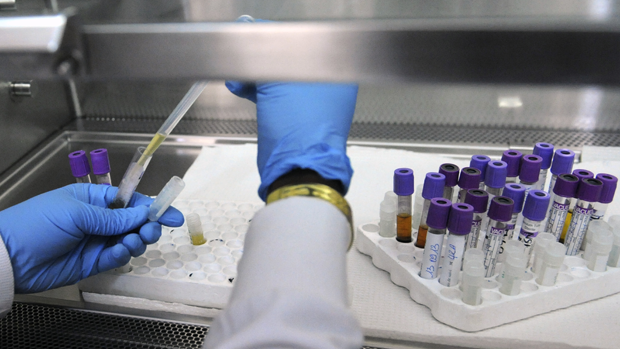Gene therapy success raises hopes of 'cure' for HIV
Doctors say engineering an HIV patient's own immune cells could eliminate the need for daily antiretroviral drugs

A free daily email with the biggest news stories of the day – and the best features from TheWeek.com
You are now subscribed
Your newsletter sign-up was successful
DOCTORS have used gene therapy to modify the immune systems of 12 patients to help "shield" them from the effects of HIV, the BBC reports.
The new treatment could replace programmes that require HIV patients to take antiretroviral medication every day.
In a study published in the New England Journal of Medicine on Wednesday, scientists said that by creating beneficial mutations in T-cells they might have found a new therapy for improving the health of people with HIV.
The Week
Escape your echo chamber. Get the facts behind the news, plus analysis from multiple perspectives.

Sign up for The Week's Free Newsletters
From our morning news briefing to a weekly Good News Newsletter, get the best of The Week delivered directly to your inbox.
From our morning news briefing to a weekly Good News Newsletter, get the best of The Week delivered directly to your inbox.
Some patients have a rare mutation in their T-cells, white blood cells that are vital to human immune responses, that prevents the virus from getting inside and multiplying.
Doctors working on the study reported that patients receiving their genome-modifying treatment had "decreased viral loads". In one patient who had received the treatment the virus could no longer be detected at all.
Out of the 12 people who took part in the test, six stopped taking their antiretroviral medication so that researchers could assess the effects of the genome-modifying treatment. In four of those patients, the amount of HIV in the blood dropped. And in one patient, the virus could "no longer be detected at all", according to a Massachusetts Institute of Technology (MIT) report.
Doctors stressed that the study was only intended to determine the safety of the treatment, rather than determining whether "HIV shielding" could be a feasible replacement for drug treatment.
A free daily email with the biggest news stories of the day – and the best features from TheWeek.com
"We are absolutely encouraged by these results," said Bruce Levine the director of the Clinical Cell and Vaccine Production Facility at the University of Pennsylvania. "It is an evolution in the treatment of HIV from daily antiretroviral therapy."
Levine, who ran the study with his colleague Carl June, noted that it was too early to say whether the treatment could come to replace daily antiretroviral drugs, The Guardian reports.
"Cure is a four letter word. We don't like to use it, particularly with HIV. We are looking at improving the health and immune function of people with HIV," Levine said.
Academics cautiously welcomed the findings. In an editorial that sat alongside the report, researchers from Stanford and Harvard Universities, Mark Kay and Bruce Walker, wrote: "The tantalising question... is whether it might actually have been partially effective. A definitive answer to this question will require additional studies."
-
 Kurt Olsen: Trump’s ‘Stop the Steal’ lawyer playing a major White House role
Kurt Olsen: Trump’s ‘Stop the Steal’ lawyer playing a major White House roleIn the Spotlight Olsen reportedly has access to significant U.S. intelligence
-
 Rubio boosts Orbán ahead of Hungary election
Rubio boosts Orbán ahead of Hungary electionSpeed Read Far-right nationalist Prime Minister Viktor Orbán is facing a tough re-election fight after many years in power
-
 Hyatt chair joins growing list of Epstein files losers
Hyatt chair joins growing list of Epstein files losersSpeed Read Thomas Pritzker stepped down as executive chair of the Hyatt Hotels Corporation over his ties with Jeffrey Epstein and Ghislaine Maxwell
-
 Home Office worker accused of spiking mistress’s drink with abortion drug
Home Office worker accused of spiking mistress’s drink with abortion drugSpeed Read Darren Burke had failed to convince his girlfriend to terminate pregnancy
-
 In hock to Moscow: exploring Germany’s woeful energy policy
In hock to Moscow: exploring Germany’s woeful energy policySpeed Read Don’t expect Berlin to wean itself off Russian gas any time soon
-
 Were Covid restrictions dropped too soon?
Were Covid restrictions dropped too soon?Speed Read ‘Living with Covid’ is already proving problematic – just look at the travel chaos this week
-
 Inclusive Britain: a new strategy for tackling racism in the UK
Inclusive Britain: a new strategy for tackling racism in the UKSpeed Read Government has revealed action plan setting out 74 steps that ministers will take
-
 Sandy Hook families vs. Remington: a small victory over the gunmakers
Sandy Hook families vs. Remington: a small victory over the gunmakersSpeed Read Last week the families settled a lawsuit for $73m against the manufacturer
-
 Farmers vs. walkers: the battle over ‘Britain’s green and pleasant land’
Farmers vs. walkers: the battle over ‘Britain’s green and pleasant land’Speed Read Updated Countryside Code tells farmers: ‘be nice, say hello, share the space’
-
 Motherhood: why are we putting it off?
Motherhood: why are we putting it off?Speed Read Stats show around 50% of women in England and Wales now don’t have children by 30
-
 Anti-Semitism in America: a case of double standards?
Anti-Semitism in America: a case of double standards?Speed Read Officials were strikingly reluctant to link Texas synagogue attack to anti-Semitism